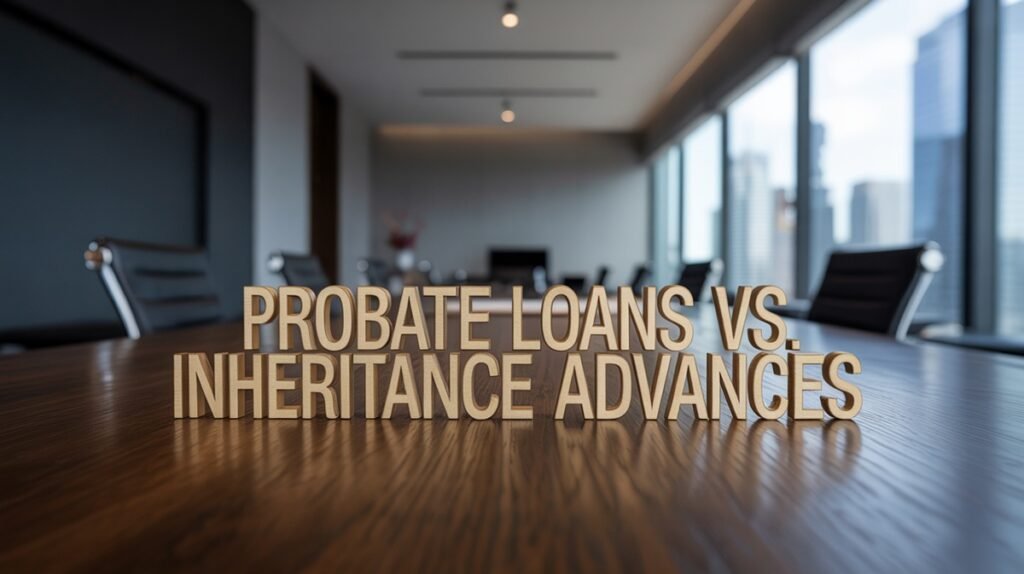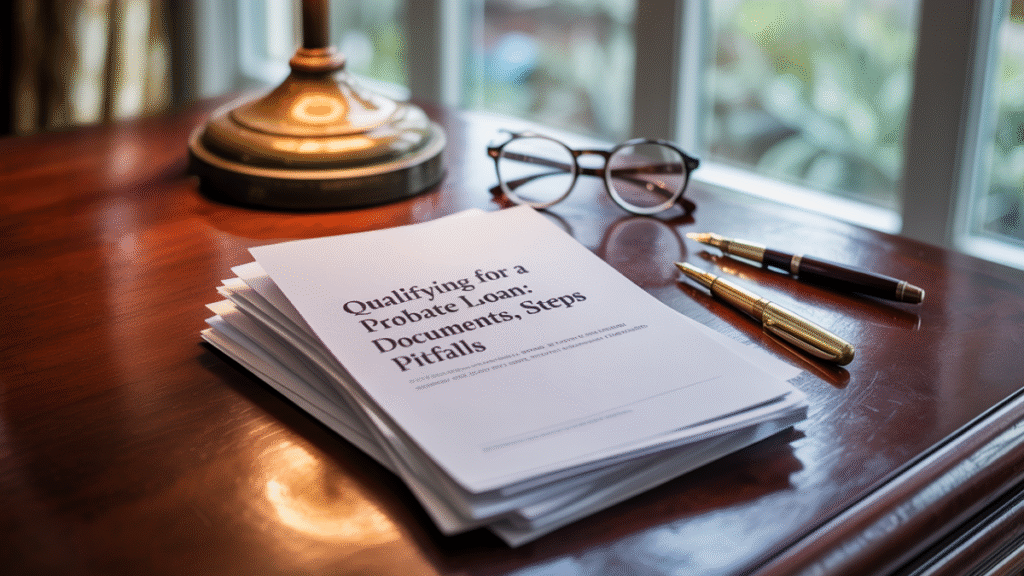| Action | What It Means |
| Creditor Claim | Formal request to be repaid from estate assets |
| Lawsuit Against Borrower | Legal case for breach of contract or misrepresentation |
| Distribution Freeze | Halts inheritance payouts until debt is resolved |
| Asset Lien | Secures repayment by attaching a claim to the estate property |
| Court-Ordered Repayment | The judge may direct how and when the loan must be repaid |
💸 Avoid Hidden Costs
Some inheritance advance companies hide fees in the fine print.
See what a fair offer really looks like before you sign.
→ Use the Cost Calculator
Getting a Feel for Probate Loans
A probate loan, or inheritance advance, lets you borrow money based on what you expect to inherit. Instead of checking your credit or income, the lender offers a portion of your estimated inheritance upfront.
- How it works: You borrow money based on your expected share of an estate.
- Who gets involved: Lenders, heirs, and the estate executor.
- When it’s repaid: Once the probate process is complete and the estate distributes the funds.
Lenders get paid back from the estate directly, usually before the heir receives their full inheritance. It’s a fast solution, but only if the estate has enough assets to cover everything.
How Repayment Normally Works
Here’s how repayment typically plays out:
- A loan is issued: You sign a loan agreement and receive the funds upfront.
- Executor is notified: The estate’s executor is officially informed and instructed to repay the loan before distributing assets to you.
- Estate settles: Once the court approves everything, the executor pays off the lender and releases any remaining inheritance to you.
This system works well when the estate has enough liquid assets and there are no disputes or delays.
Why a Probate Loan Might Not Get Paid Back
Things don’t always go as planned. Several problems can prevent the loan from being repaid:
- Estate insolvency: If the estate’s debts and taxes exceed its assets, there may not be enough remaining to repay the loan.
- Legal delays: Will contests or creditor disputes can drag probate out for months—or even years.
- Executor missteps: If the executor makes errors, mishandles funds, or overlooks the lender’s claim, repayment might fall through.
- Inheritance overestimation: Borrowing more than your actual inheritance can result in a shortfall that leaves the lender unpaid.
Each of these scenarios puts pressure on everyone involved, especially if the estate can’t be liquidated quickly.
The Legal Fallout of Missing a Probate Loan Payment
When a probate loan goes unpaid, the lender doesn’t just walk away. They have several legal tools at their disposal to pursue repayment.
- Creditor claims: Lenders can file a formal claim with the probate court, requesting recognition as a creditor. If the court approves it, they’ll be prioritized for repayment from the estate.
- Lawsuits: If the borrower provided inaccurate information or breached the loan agreement, the lender may sue for damages. In some cases, they could pursue the heir personally—especially if a personal guarantee was involved.
- Distribution freezes: Lenders can request that the court pause inheritance distributions until they’re repaid. That means delays for every beneficiary.
- Asset liens: Some lenders may seek to place liens on real estate or other estate property to force a sale or ensure they get their money.
These legal actions can quickly complicate and delay the probate process.
How It Affects Everyone Else Involved
An unpaid probate loan affects not only the borrower. It causes ripples throughout the estate.
- Smaller inheritances: If the loan can’t be repaid from one heir’s share, repayment may come from the estate’s general assets—cutting into what others receive.
- Probate delays: Court hearings, legal filings, and creditor disputes can put estate distribution on hold.
- Executor risk: Executors have a legal duty to manage the estate responsibly. Failing to repay a valid loan can put them at risk of court penalties or personal liability.
- Family tension: When one heir’s loan delays the inheritance of everyone else, it often leads to resentment and conflict among family members.
The fallout can be long-lasting, especially in estates with limited assets or complicated ownership structures.
What to Do If Repayment Becomes a Problem
If it appears that a probate loan won’t be repaid on time—or at all—there are several ways to address the issue without resorting to court.
- Negotiate with the lender: Some lenders are open to new payment terms, partial settlements, or time extensions. Communication is key.
- Petition the probate court: The executor can request that the court approve the sale of estate assets or modify repayment schedules to pay off the loan.
- Use personal funds: The borrower may choose to repay the loan personally to avoid further estate complications.
- Refinance the debt: Executors or heirs might consider refinancing the loan or getting another estate-level loan to cover the gap.
- Challenge the loan terms: If the loan was misleading, predatory, or issued under pretenses, legal action might be taken to invalidate or renegotiate it.
Working with a probate attorney during this time can help protect everyone’s rights and ensure fair outcomes.
Avoiding Probate Loan Headaches From the Start
Planning a little can really help with probate loans. Here are some tips to avoid repayment issues later:
- Get a proper estate valuation: Always understand the full value of the estate and your expected share—after debts and taxes—before borrowing.
- Talk to the executor early: Determine if the estate has sufficient liquid assets and estimate the expected duration of the probate process.
- Read the loan terms carefully: Don’t sign anything without understanding the interest, fees, and repayment rules.
- Don’t borrow the full amount: Leave some wiggle room in case the estate’s value drops or legal issues arise.
- Involve legal and financial pros: A probate attorney or financial advisor can help you navigate loan offers and avoid risky terms.
It’s much easier to prevent problems before the estate ends up in court.
Conclusion
When a probate loan isn’t repaid, it can turn a straightforward inheritance into a lengthy and stressful legal process. From lawsuits and creditor claims to delayed payouts and family disputes, the consequences are real and far-reaching. Probate loans offer a short-term financial solution, but only if the estate is stable, the executor is well-organized, and repayment is carefully planned.
Key takeaway: Always approach probate loans with a solid understanding of your inheritance, the estate’s financial health, and potential risks. A cautious approach now can save months—or even years—of complications later.
FAQs
Can I obtain a probate loan if there are other debts associated with the estate?
Yes, but lenders will review all outstanding debts first. If the estate is heavily in debt, they may reduce the loan amount or decline it altogether due to increased risk.
What if the estate includes property but no cash?
In that case, the executor may need to sell assets, such as a house, to repay the loan. Lenders might agree to wait for the sale to be completed before collecting.
Do probate loans come with interest rates or fees?
Absolutely. Most lenders charge either flat fees or interest based on the loan amount and the estimated probate timeline. These costs are deducted from the inheritance upon repayment.
Is the loan forgiven if the estate runs out of money?
Not usually. If the estate is insolvent, the lender may not recover their money—but they could pursue the borrower personally, depending on the terms of the agreement.
Can a probate loan delay the entire estate settlement?
Yes. If there’s a repayment dispute or creditor claim, it can put the whole probate process on pause until everything is resolved.



